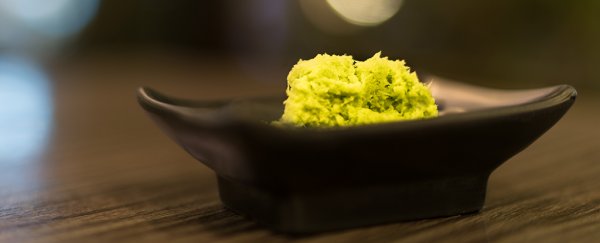As strange medical cases go, this one is quite the collector's item: A 60-year-old woman ate so much wasabi, believing it to be the similarly coloured avocado, that she developed a type of heart dysfunction typically brought on by intense emotional or physical stress.
The bizarre series of events – like many tales of excess – began to unfold at a wedding, but here it was the sushi condiment rather than alcohol that caused the drama.
Based on the details we have in the case report, we don't know how the mix up happened, but the woman somehow mistook the wasabi laid out for seasoning as the green fruit. The next day, she found herself in hospital.
"After she ate the wasabi, she felt a sudden pressure in her chest radiating to her arms, which lasted [a] few hours," explains the case report. "She decided not to leave the wedding and the pain started to subside."
"On the following day, she felt weakness and general discomfort, prompting her to seek medical evaluation."
From a medical perspective, this case is well worth noting: the condition that the wasabi brought on, takotsubo cardiomyopathy (or 'broken heart syndrome'), causes the left ventricle to suddenly and temporarily get weaker under stress.
The symptoms of takotsubo cardiomyopathy - so named because the left ventricle adopts the shape of a Japanese octopus-trapping jar called a takotsubo - tend to look like a heart attack, with chest pains among the consequences.
What's less clear is what actually causes broken heart syndrome, which is where this patient's unusual experience could provide valuable clues – something in the wasabi seems to have set off the condition, rather than any stress.
The 'broken heart' nickname of the condition has come about because takotsubo cardiomyopathy is often linked to the loss of a close partner, relative, or friend – the emotional toll appears to have a physical effect on the heart. A woman in the US was diagnosed with the condition a couple of years ago after the death of her dog, for instance.
However, this heart dysfunction has never been linked with any kinds of foods before, except for severe anaphylactic reaction due to allergy, which wasn't involved here. It's something else that medical experts can now look out for in assessing risk and analysing how exactly takotsubo cardiomyopathy gets triggered.
The good news is that the woman was back to normal health again after a month of treatment. While takotsubo cardiomyopathy can lead to more serious heart problems, the people who experience it usually make a full recovery.
Nevertheless, it's a reminder to all of us not to get carried away at weddings – keep your drinking in moderation and your foodstuffs correctly identified.
"To the best of our knowledge, this is the first report of takotsubo cardiomyopathy triggered by wasabi consumption," writes the team from the Soroka University Medical Centre in Israel.
Details of the case have been published in BMJ Case Reports.
